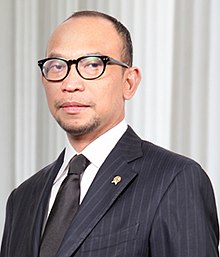Muhammad Chatib Basri
Indonesian economist and politician From Wikipedia, the free encyclopedia
Muhammad Chatib "Dede" Basri (born 22 August 1965) is an Indonesian economist who served as Minister of Finance in the Second United Indonesia Cabinet from 21 May 2013 to 20 October 2014 during the presidency of Susilo Bambang Yudhoyono.[1] Before he was appointed Minister of Finance he was the head of the Indonesian Investment Coordinating Board (Badan Kordinasi Penanaman Modal, or BKPM).
Chatib Basri | |
|---|---|
 Basri in 2013 | |
| 28th Minister of Finance | |
| In office 21 May 2013 – 20 October 2014 | |
| President | Susilo Bambang Yudhyono |
| Preceded by | Agus Martowardojo |
| Succeeded by | Bambang Brodjonegoro |
| 15th Head of the Investment Coordinating Board | |
| In office 14 June 2012 – 1 October 2013 | |
| President | Susilo Bambang Yudhyono |
| Preceded by | Gita Wirjawan |
| Succeeded by | Mahendra Siregar |
| Personal details | |
| Born | Muhammad Chatib Basri 22 August 1965 Jakarta, Indonesia |
| Residence | Jakarta |
| Alma mater | University of Indonesia Australian National University |
He served in several senior economic advisory positions before being appointed as chair of the Investment Coordinating Board in 2011. He was, amongst other roles, an advisor to the former Indonesian Minister of Finance Sri Mulyani Indrawati Deputy Chair of the president's Economic National Committee (Komite Ekonomi Nasional, or KEN), and was Sherpa to the president of Indonesia for G-20 meetings.
Basri has a PhD from the Australian National University. He also teaches in the Faculty of Economics at the University of Indonesia (FEUI) and was Director of the Lembaga Penyelidikan Ekonomi dan Masyarakat (Institute for Economic and Social Research, or LPEM) within the FEUI and Ash Centre Senior Fellow at the Harvard Kennedy School 2015–2016.[2] He was also a fellow at the Centre on Global Transformation University of California at San Diego[3] He is now a member of The World Bank Advisory Council on Gender and Development][4] and also a member of the Advisory Board of Centre for Applied Macroeconomic Analysis at the Australian National University.[5]
Dede Basri's areas of expertise include international trade, macroeconomics, and political economy. As an academic economist, he has published in various economic journals such as World Economy, Asian Economic Papers, and the Bulletin of Indonesian Economic Studies. He has also been a Thee Kian Wie Distinguished Visiting Professor at the Australian National University [6] and an adjunct fellow in the Arndt-Corden Department of Economics at the Australian National University. Dr.Basri is also a member of the Group of Eminent Personalities of the OECD Development Centre.[7]
Early life and education
Muhammad Chatib Basri was born on 22 August 1965 in Jakarta, Indonesia, as the child of Chairul Basri and Nurbaiti.[8] His father was from Rao, Pasaman Regency.[8] He is the nephew of writer Asrul Sani.[8] During his childhood, Basri wanted to became a writer like his uncle.[8] He went to Faculty of Economic and Business at University of Indonesia and graduated in 1992, earned the title of "the most outstanding student".[8] Basri earned his master's degree from Australian National University in 1996 majoring in economic development and earned his Ph.D from the same university in 2001.[8]
Personal life
Basri is married to Dana Iswara Basri, a journalist.[9]
Career
Basri started his career as a researcher assistant at Department of Economics, Research School of Pacific and Asian Studies in 1994 for seven years.[8] He also became a lecturer and researcher at the Institute for Economic and Social Research (LPEM) at University of Indonesia until 2001.[8] Basri then worked at several educational institutions both at home and abroad, and worked as a consultant in various financial institutions, such as World Bank, United States Agency for International Development, Australian Aid, OECD, UN Trade and Development, Asian Development Bank and become a member of the Asia and Pacific Regional Advisory Group of the International Monetary Fund.[8]
References
Wikiwand - on
Seamless Wikipedia browsing. On steroids.
